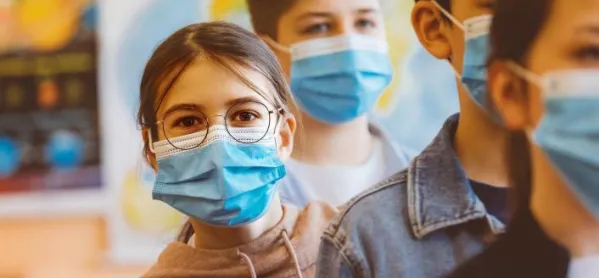More than 1 in 20 primary pupils have Covid

New figures released by the Office for National Statistics (ONS) show that more than one in 20 primary school-age pupils tested positive for Covid-19 last week.
The ONS data published today shows on 11 December, 5.56 per cent of those aged 2 to those in Year 6 tested positive.
This compares with the week ending 1 December when, according to figures, 4.18 per cent of children in the same age bracket tested positive.
The news comes as data published by the UK Health Security Agency (UKHSA) today shows there were already 477 known Omicron cases among children from birth up to age 19 as of the end of last week (12 December) - making up the fourth-highest age group.
- School staff more likely to catch Covid than other workers
- Pupil absence rises by nearly 30,000 in fortnight
- Omicron: Heads warn of school closures
The percentage of people testing positive for Covid-19 has remained highest in school-age children for the past three weeks, although the number of secondary school students testing positive has gone down in the past week from 3.87 per cent in the week ending 1 December to 2.82 per cent in the week ending 2 December.
Earlier this week, the Conservative chair of the Commons Education Select Committee Robert Halfon MP warned of “de facto school closures” in the face of rising infections.
Kevin Courtney, joint general secretary of the NEU teaching union, called for further mitigations and safety measures including ventilation, air filtration, mask wearing and isolation of very close contacts.
“Government needs a plan for next term,” he said.
Geoff Barton, general secretary of the Association of School and College Leaders, said he hoped the school holiday period would provide a “firebreak” and help reduce infections among children.
But he said: “The big risk is obviously that this simply picks up again next term, and does so at a much higher rate because of the prevalence of the Omicron variant.”
Mr Barton joined calls for more measures such as testing and ventilation.
“The government must launch a public information campaign to encourage twice-weekly home testing among eligible pupils and it must provide government-funded air cleaning units to all schools and colleges that need them. Everything possible must be done to reduce the risk of Covid transmission and keep children where they need to be - in the classroom.”
Paul Whiteman, general secretary of school leaders’ union NAHT, said “choppy waters lie ahead” when considering potential disruption to education due to rising case numbers.
“The reality is that if school staff become ill with Covid there are going to be challenges in maintaining provision, be that in-person or remote.
“Every single school leader will be determined to minimise any disruption to learning, but it does seem as though choppy waters lie ahead and that some form of disruption at the start of next term is looking sadly inevitable.
“It is very difficult to predict the scale of that disruption at this stage, but it would be naïve to pretend that Omicron won’t have an impact on education next term.”
Yesterday, education secretary Nadhim Zahawi called on school leaders to encourage ex-teachers to “sign up” to help with Covid-19 staff shortages.
In an email to heads, Mr Zahawi said the government was looking at what measures to put in place “to boost supply capacity”, including “offering advice to ex-teachers who are keen to support schools” and helping to register with supply agencies.
On 14 December, data released by the Department for Education revealed that pupil absence due to Covid-related reasons had risen by nearly 30,000 in a fortnight, with teacher and leader absence rising by 20 per cent.
However, in January of this year, then health secretary Matt Hancock said there was “no evidence” teachers were at a higher risk from Covid.
You need a Tes subscription to read this article
Subscribe now to read this article and get other subscriber-only content:
- Unlimited access to all Tes magazine content
- Exclusive subscriber-only stories
- Award-winning email newsletters
Already a subscriber? Log in
You need a subscription to read this article
Subscribe now to read this article and get other subscriber-only content, including:
- Unlimited access to all Tes magazine content
- Exclusive subscriber-only stories
- Award-winning email newsletters
topics in this article



